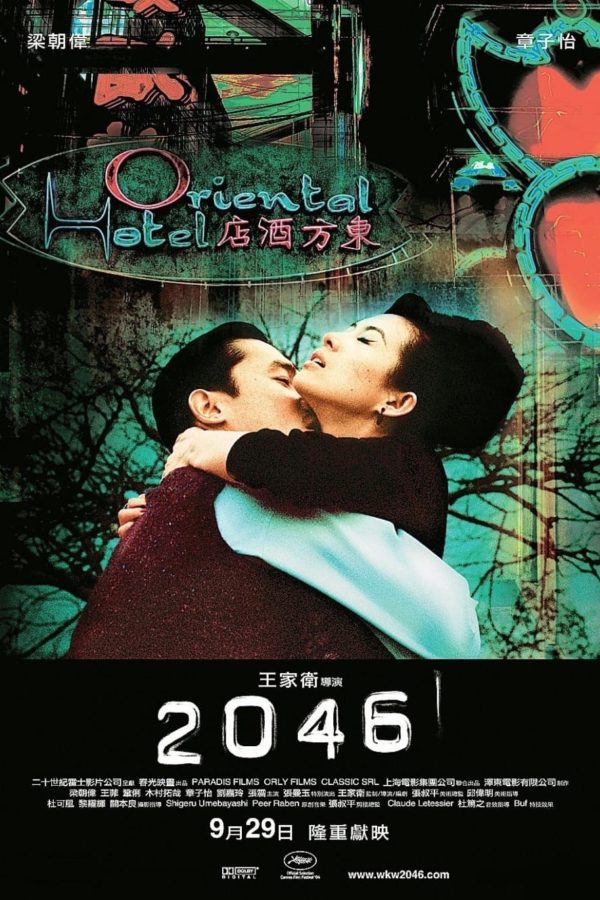Watch a movie at the CIA Cinematheque. Just not “2046.”
Courtesy of Mei Ah Entertainment
The contrived romances of “2046” could make one question if director Wong Kar-wai even knows what love is.
September 3, 2021
I had a theory, halfway through “2046”—recently screened at the Cleveland Institute of Art Cinematheque—that director Wong Kar-wai writes these simplistic yet overwrought love stories because he’s afraid of how complicated and stupid love actually is. If a character even briefly surrendered their stoic qualities, it would become too human for his liking. His courtly romances are shop-worn to the point that you wonder how he could possibly see dramatic value in their repeated iterations. And in this iteration you could almost get the sense, after a while, that Wong is attempting a kind of self-satire, but this isn’t the case. Even in his numerous playful misunderstandings and his high-flying narrative crosshatches, he always comes back to deathly seriousness.
In this film’s predecessor, “In the Mood for Love,” released in 2000, male lead Tony Leung seemed to be short for words. In the sequel, you wish he’d stop talking. It seems after being so thoroughly romantically thwarted by the social constraints of Hong Kong in the ’60s, he decided instead to become a loathsome lothario, which is apparently more acceptable. Now he leaves a string of vulnerable and miserable women clad in form-fitting qipaos in tears as he walks out of their lives. But of course he suffers the most—he bears the scorn of being so unavailable.
Yet Leung’s militant and sneering boorishness is somehow not particularly vexing. This is mostly because Wong’s conception of his characters is so resolutely shallow that it renders any discord between them completely dull. Beyond his remedial romantic disharmony, he doesn’t have much of a flair for gripping characterization or an ear for dialogue. A reliable mark of bad writing is when it’s glaringly obvious that every character is the creation of the same mind. They have the same mind, even if their intentions prove different; they all talk the same way.
One mild exception—mild because she’s barely on screen for a few minutes—would be Lulu, a call girl returning from Wong’s previous movie, “Days of Being Wild,” beautifully acted by Carina Lau. She achieves a masterful humanity in face and gait that completely transcends the diminutive quality of her presence.
The story at last picks up once we board the fictional train to the metafictional location of 2046. But it doesn’t stay that way as, even in his fictional fictions, Wong is unable to deviate from the same narrative structures he always employs. At the very least his visual eye comes out in these scenes, which are sumptuously photographed and filled with luminous shades of neon red and green. But once he settles on a vantage point, we’re treated to more romantic pomp. The fembot aboard the hyperloop, despite being circuitry and wires, falls for Leung’s character’s fictional counterpart, after a bit of feigned hesitance. Again and again, it ends in tears.
This is a movie that could plausibly end three or four times before it actually does, and that’s because the ultimate consequences of Leung’s dalliances and his missed connections are as uninteresting on screen as one can imagine them.
It’s almost a little funny that the movie is called “2046,” because Wong’s sensibilities seem to be stuck in 1946, the same year that “Brief Encounter,” a British film by David Lean screened to international audiences, which no doubt greatly inspired the dramatic cues of Wong’s 21st-century works. Lean’s ’40s England resembles Wong’s ’60s Hong Kong in social norms, as well as in his characters, who are essentially department store mannequins posed in tedious affairs. There was at least a precision to “Brief Encounter” and “In the Mood for Love,” with their compact runtimes benefitting the films greatly. Here, Wong sprawls out over two hours of numerous affairs that overstay their welcome.
“In the Mood for Love” will also be playing at the CIA Cinematheque, if you’re interested in seeing more of Wong’s films near campus, on Oct. 1-2. If you only see one of the two, let it be that one.


